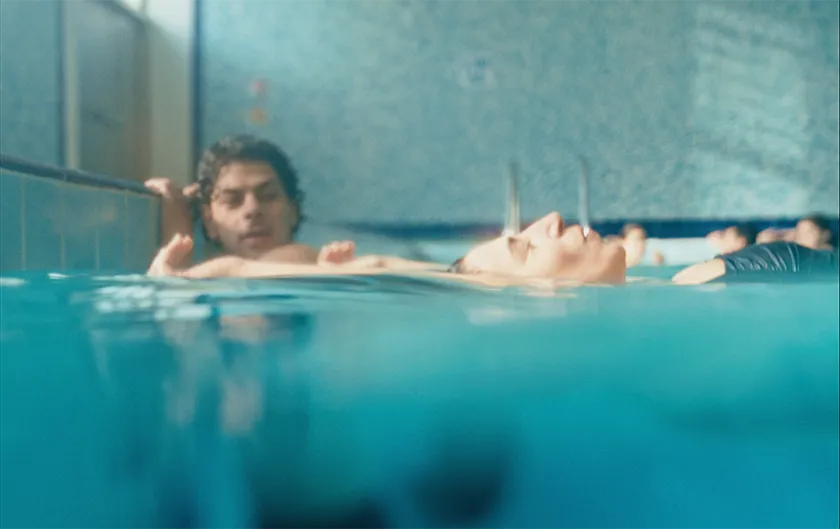With the tender yet quietly devastating Sink (Gharaq), Zain Duraie shines a spotlight on mental health in Jordan through a mother-son relationship.
Writer & Director: Zain Duraie
Genre: Drama, Thriller
Run Time: 88′
BFI London Film Festival Screening: October 16-18, 2025
U.S. Release Date: TBA
U.K. Release Date: TBA
“You’re a doctor in the making, but I wouldn’t trust you with a dead body. Are you mocking my class, Basil?” a teacher asks the young protagonist of Zain Duraie’s Sink (Gharaq) at the beginning of the movie, after he failed to give a presentation to the class because his nerves took over. Though we don’t see what happens next, we find out soon enough, when our well-meaning teenager gets home.
“It wasn’t my fault,” the 17-years-old Basil (Mohammad Nizar, of Selahy) tells his mum, Nadia (Clara Khoury, of The Voice of Hind Rajab), explaining that all he did was grab the teacher’s notebook, to find out what he was writing about him, and as the teacher grabbed it right back, the student’s elbow “hit his nose by mistake.” Still, the whole family is summoned by the principal, and just like that, Basil is suspended.
Did Basil really do what he’s accused of? Was the principal right in punishing the boy? Or is Basil’s father, Jalal (Wissam Tobaileh, of A Private War), right in blaming the school for not making him feel safe? While those are all interesting, valid questions that, alone, would already make for a compelling, timely story, this is not really the point of Sink. Writer-director Zain Duraie is more interested in exploring her characters than delving into a single incident, and the result is a fascinating, potent film that offers recognition rather than placing blame.
Sink takes place in Jordan, and mainly centers on the relationship between a mother and a son, and how it evolves as they both come to terms – each in their own time, in completely different ways but never fully alone – with how much of a toll Basil’s undiagnosed mental illness, and the lack of a support system in a society that would rather ostracize than understand, is taking on them.
The film truly takes off when Nadia’s husband leaves to attend an event with their two younger sons, Amer (Anton Qasir) and Dima (Tara Al Rifai). Since Basil isn’t allowed to go – the other parents “don’t want [their sons] to be influenced” – Nadia stays home with him. Mother and son don’t talk to much; their relationship is defined by silent stares and physical gestures, and by a mutual, unspoken desire to understand themselves and each other that often leads them to interact in unusual ways. Nadia stares at Basil when he studies, and he lets her, knowing it comes from a place of love. In turn, the mother knows her son sometimes needs to express himself in unconventional ways, and tries to embrace that side of him too.
And so they swim, play games, and even dance together, at times even pretending to be animals. “You’re the best mum in the world,” he tells her, seeing her unhappiness reflected in his own, and understanding how hard it must have been for her to put her entire life on hold for him, even if he knows she loves him. It’s an intimate, tender relationship, but it’s also a heartbreaking one, defined by what’s unsaid much more than by what’s spoken out loud.
And it’s also a disturbing, even dangerous one, as when Basil loses control, he can be unpredictable, violent and even ruthless in a way that not only he isn’t aware of, but that he also cannot control. And in the middle of it all is Nadia, who loves her son and wants to support him, but who clearly doesn’t have the tools to deal with something that’s so much bigger than the little bubble of their creation in which they’ve both been taking refuge.
What’s most astonishing about Sink is Duraie’s ability to move between very jarring tones and genres and still deliver a narrative that’s not only coherent, but also incredibly effective at sending many messages across. At its core, this is the empathetic, complex story of a mother and a son who are barely just managing not to drown – it’s no coincidence that Nadia and Basil often go swimming together, and water is a recurring element in the film, starting from its title.
Yet the atmosphere in which it all takes place can change very quickly and in unpredictable ways, making room for both introspection and tension without being afraid to tap into some pretty dark territory. This succeeds, in part, thanks to a well-written script and cinematography (Farouk Laâridh) that frames the film’s characters in a way that really highlights their connection. But technically speaking, the real star of the movie is superb sound design (Isra Banuelos) that places us into both characters’ minds and makes these shifts in atmosphere so affecting.
Sink is as much about Basil as it is about Nadia, and the journeys that both characters take are ultimately the very core of the film. In her director’s note, Duraie shares that she was inspired to write the movie by experiences she witnessed, and that families in the Arab world might “quietly recognize.” Sink is a quiet film, but it’s also a loud one in the way it tackles a subject that’s still considered a taboo in many countries, asks us to redefine the idea of what’s “normal,” and urges us to change our attitude toward mental health before it’s too late.

Nadia has been in denial for her entire life, but she eventually comes to understand that she simply cannot be quiet and hide anymore, because love and acceptance, alone, are not enough. There needs to be a system in place to support both people with mental health issues and their caregivers – a role that, especially in patriarchal societies, is often confined to women – and to educate the world around them. With an unpredictable script that nails the balance between emotion and horror, superb performances from Khoury and Nizar, and a perfect ending that leaves room for hope, Duraie’s tender, heartbreaking, disquieting film offers all the Nadias out there a life jacket to keep them afloat.
Sink (2025): Movie Plot & Recap
Synopsis:
When a 17-year-old is suspended for acting out at school due to an undiagnosed mental illness, his mother tries to offer him as much support and acceptance as she can. But soon, both mother and son come to realize that what they’re dealing with is bigger than they are, and that their actions, alone, are not enough.
Pros:
- A story that contains plenty of empathy and introspection but also manages to tackle multiple jarring tones, blending tenderness with unease and even danger
- Fantastic acting from both leads
- Superb technical execution, particularly the sound design
- A film that tackles many themes in a unique and unpredictable way and ultimately sends across an important message about mental health and the need for change
- A perfect ending that beautifully sums up the entire movie while also leaving room for hope
Cons:
- If you don’t like slow paced, character-focused films, this might not be the film for you
- Some of the scenes are pretty disturbing, particularly one involving animals. While it does help make the film more unique and effective in the atmosphere it wants to convey, if you’re triggered by this sort of thing you might want to miss this one out.
Sink will be screened at the BFI London Film Festival on 16-18 October, 2025.

